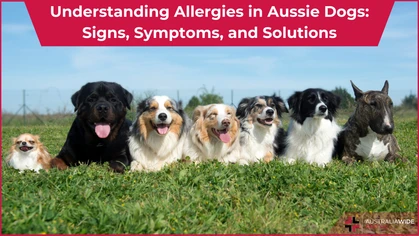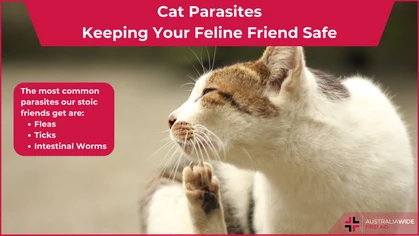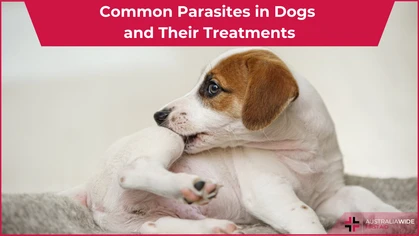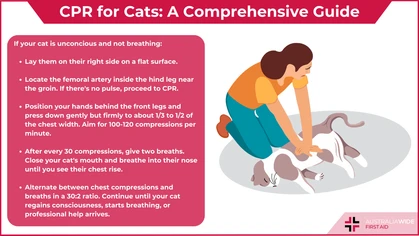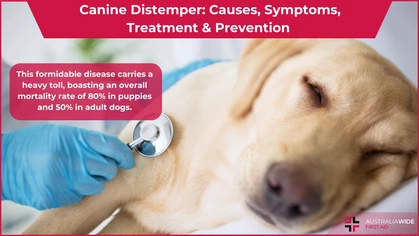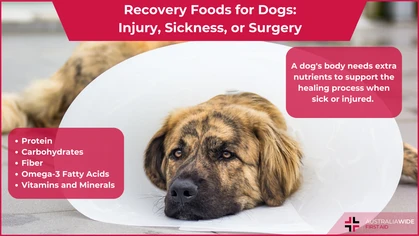A Guide to Recognizing and Addressing Common Avian Health Concerns

Pets
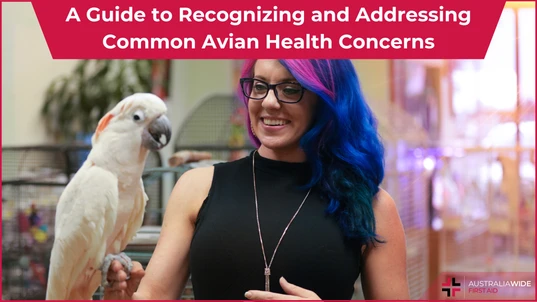 From respiratory distress to changes in droppings and abnormal behaviours, this guide outlines the key indicators of illness that require immediate attention.
By understanding these warning signs, bird owners can take proactive steps to ensure their feathered companions receive timely medical treatment, ultimately promoting their health and well-being.
From respiratory distress to changes in droppings and abnormal behaviours, this guide outlines the key indicators of illness that require immediate attention.
By understanding these warning signs, bird owners can take proactive steps to ensure their feathered companions receive timely medical treatment, ultimately promoting their health and well-being.
Psittacosis
Psittacosis, also known as Parrot Fever, caused by Chlamydia psittaci (Bacteria), can infect various species, such as parrots, budgerigars and cockatiels. Signs and symptoms include:- Respiratory symptoms like coughing, sneezing, and difficulty breathing
- Greenish or yellowish discharge from the eyes and nose
- Lethargy, decreased appetite, and weight loss
- Diarrhea
- Nervous system signs such as tremors or seizures
Avian Pox
Caused by a virus, avian pox can affect various bird species, leading to wart-like growths on the skin, lesions in the mouth, respiratory distress, and sometimes death. Signs and symptoms include:- Wart-like growths on the skin, particularly on unfeathered areas like the cere, eyelids, and legs
- Lesions in the mouth, throat, or respiratory tract
- Reduced appetite
- Respiratory distress if lesions obstruct the airways
Psittacine Beak and Feather Disease (PBFD)
A viral disease affecting parrots, cockatoos, and other psittacine birds. It causes feather abnormalities, beak deformities, immuno-suppression, and eventual death. Signs and symptoms include:- Feather abnormalities such as missing feathers, deformed feathers, or abnormal coloring
- Beak abnormalities including overgrowth or deformities
- Immunodeficiency leading to secondary infections
- Weight loss and lethargy
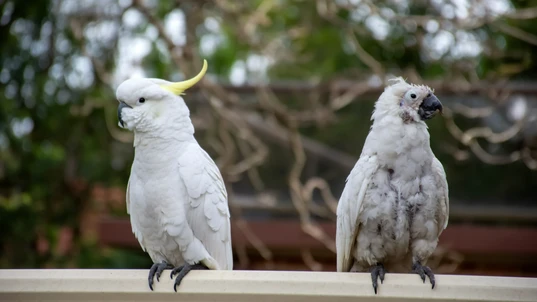
Sulphur-crested cockatoo sitting on a fence close to another cockatoo suffering from Psittacine beak and feather disease - PBFD.
Aspergillosis
A fungal infection caused by Aspergillus spp., commonly found in mouldy environments. Birds can inhale spores, leading to respiratory issues, weakness, and death if left untreated. Signs and symptoms include:- Respiratory symptoms such as wheezing, difficulty breathing, and nasal discharge
- Lethargy and weakness
- Decrease in appetite
- Sometimes neurological symptoms if the infection spreads to the central nervous system
Avian Gastric Yeast (AGY) Infection
Caused by a yeast species called Macrorhabdus ornithogaster, AGY can lead to symptoms such as weight loss, regurgitation, diarrhoea, and lethargy in affected birds. Signs and symptoms include:- Regurgitation or vomiting
- Diarrhea or abnormal feces consistency
- Weight loss despite a good appetite
- Lethargy and weakness
Newcastle Disease
A highly contagious viral infection affecting many bird species, Newcastle disease can cause respiratory, nervous system, and digestive tract issues, often leading to high mortality rates in unvaccinated populations. Signs and symptoms include:- Respiratory symptoms such as sneezing, coughing, and nasal discharge
- Nervous system signs like tremors, paralysis, or circling
- Digestive system issues including diarrhea
- Sudden death, especially in unvaccinated birds
Egg Binding
A situation where a female bird is unable to expel an egg from her reproductive tract, leading to potentially life-threatening complications if left untreated. Signs and symptoms include:- Straining and difficulty in passing an egg
- Lethargy and weakness
- Loss of appetite
- Abdominal distention and discomfort
Polyomavirus
A viral infection primarily affecting young parrots, polyomavirus can cause severe illness, including feather abnormalities, weight loss, and death. Signs and symptoms include:- Feather abnormalities such as abnormal contour, discoloration, or missing feathers
- Weight loss and poor growth in juvenile birds
- Bleeding under the skin (petechiae) or in feather shafts
- Lethargy and weakness
Home Care for Sick Birds: Supporting Your Feathered Friend's Recovery
There are some general supportive care measures you can take at home to help alleviate symptoms or support your bird's recovery:- Provide a warm and quiet environment: Keep the bird in a warm, quiet, and stress-free environment to promote comfort and reduce energy expenditure.
- Hydration: Ensure the bird has access to fresh, clean water at all times. If the bird is showing signs of dehydration, you can offer electrolyte solutions specifically formulated for birds. Consult a veterinarian for appropriate recommendations.
- Nutrition: Offer nutritious and easily digestible foods such as fresh fruits and vegetables, cooked grains, and high-quality commercial bird pellets. Avoid offering fatty or sugary treats during illness.
- Humidity: Some respiratory conditions may benefit from increased humidity. Use a humidifier in the room or place the bird's cage in a bathroom with the door closed while a hot shower is running (ensure the bird is not exposed to direct steam).
- Isolation: If there are multiple birds and you suspect one is sick, isolate the sick bird to prevent the potential spread of disease to others.
- Cleanliness: Maintain a clean environment for the bird by regularly cleaning its cage, food and water dishes, and perches. This helps reduce the risk of secondary infections.
- Medication administration: If a veterinarian prescribes medication for the sick bird, carefully follow their instructions for administration, dosage, and duration of treatment.
- Monitoring: Keep a close eye on the bird's condition and behaviour. Note any changes in appetite, activity level, breathing, or appearance, and report these to the veterinarian promptly.
When to Seek Veterinary Care for Your Pet Bird: Understanding Signs of Illness and When to Act
It's important to seek veterinary care for pet bird if notice any signs of illness or abnormal behaviour. Here are some specific situations when it's crucial to consult with a veterinarian experienced in avian medicine:- Sign of respiratory distress: If the bird is breathing rapidly, wheezing, gasping for air, or showing other signs of respiratory distress, it's a medical emergency requiring immediate attention.
- Loss of appetite or weight loss: A sudden decrease in appetite or unexplained weight loss can indicate underlying health problems and should be evaluated by a veterinarian.
- Changes in droppings: Any significant changes in the colour, consistency, or frequency of the bird's droppings may indicate digestive or other health issues.
- Lethargy and weakness: If the bird appears unusually tired, weak, or lethargic and lacks its usual energy and activity level, it could be a sign of illness.
- Abnormal behaviour: Watch for any unusual behaviours such as excessive sleeping, reluctance to perch, head tilting, or balance problems, which may indicate neurological or systemic issues.
- Visible sign of illness: This includes any visible abnormalities such as lumps, growths, wounds, or changes in feather condition or colour.
- Difficulty in breeding and laying egg: If the bird is struggling to breed or lay eggs, or if there are complications during egg-laying, veterinary assistance is needed.
- Any other concerning symptoms: Trust instincts as a caregiver. If you're worried about the bird's health for any reason, it's better to seek professional advice sooner rather than later.
Conclusion
Knowing when to seek veterinary care for pet bird is essential for maintaining its health and well-being. By recognizing the signs and symptoms of illness early on, you can help your feathered friend receive the necessary treatment promptly. Whether it's respiratory distress, changes in droppings, or unusual behaviours, don't hesitate to consult with a qualified avian veterinarian. A proactive approach can make a significant difference in your bird's health and happiness.
Originally published at
https://www.australiawidefirstaid.com.au/resources/common-avian-health-concerns
as part of the Australia Wide First Aid Articles Library
